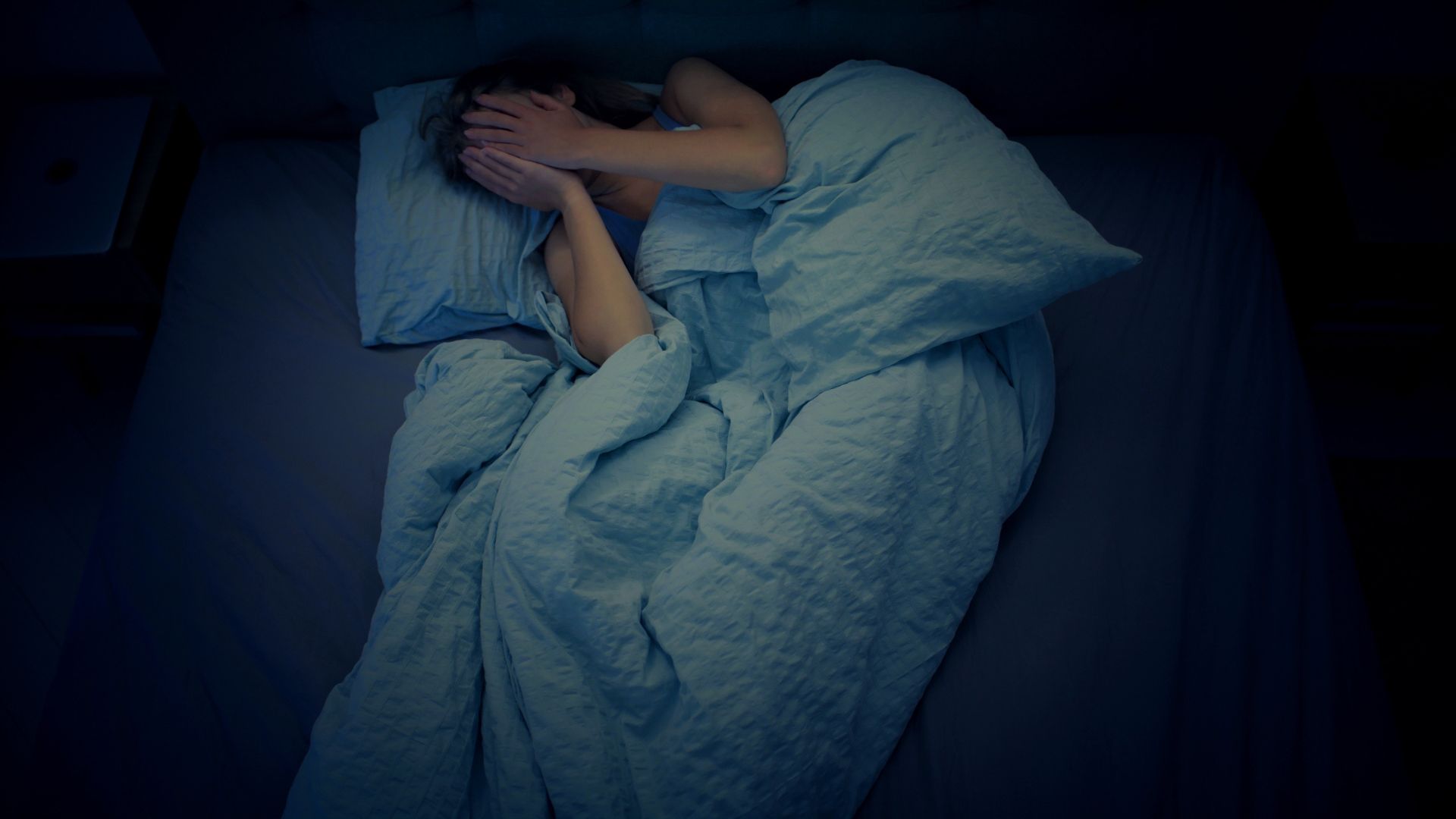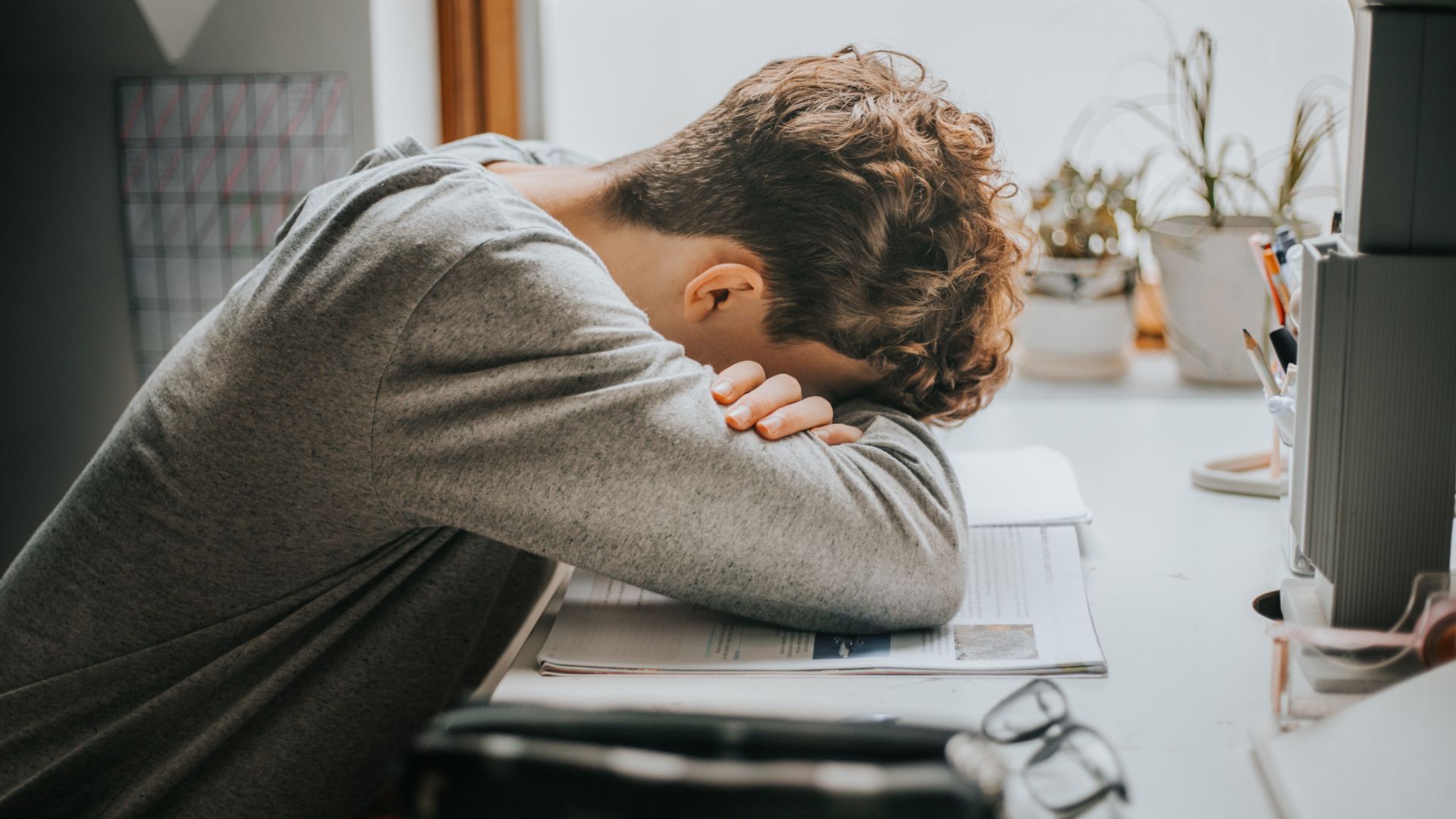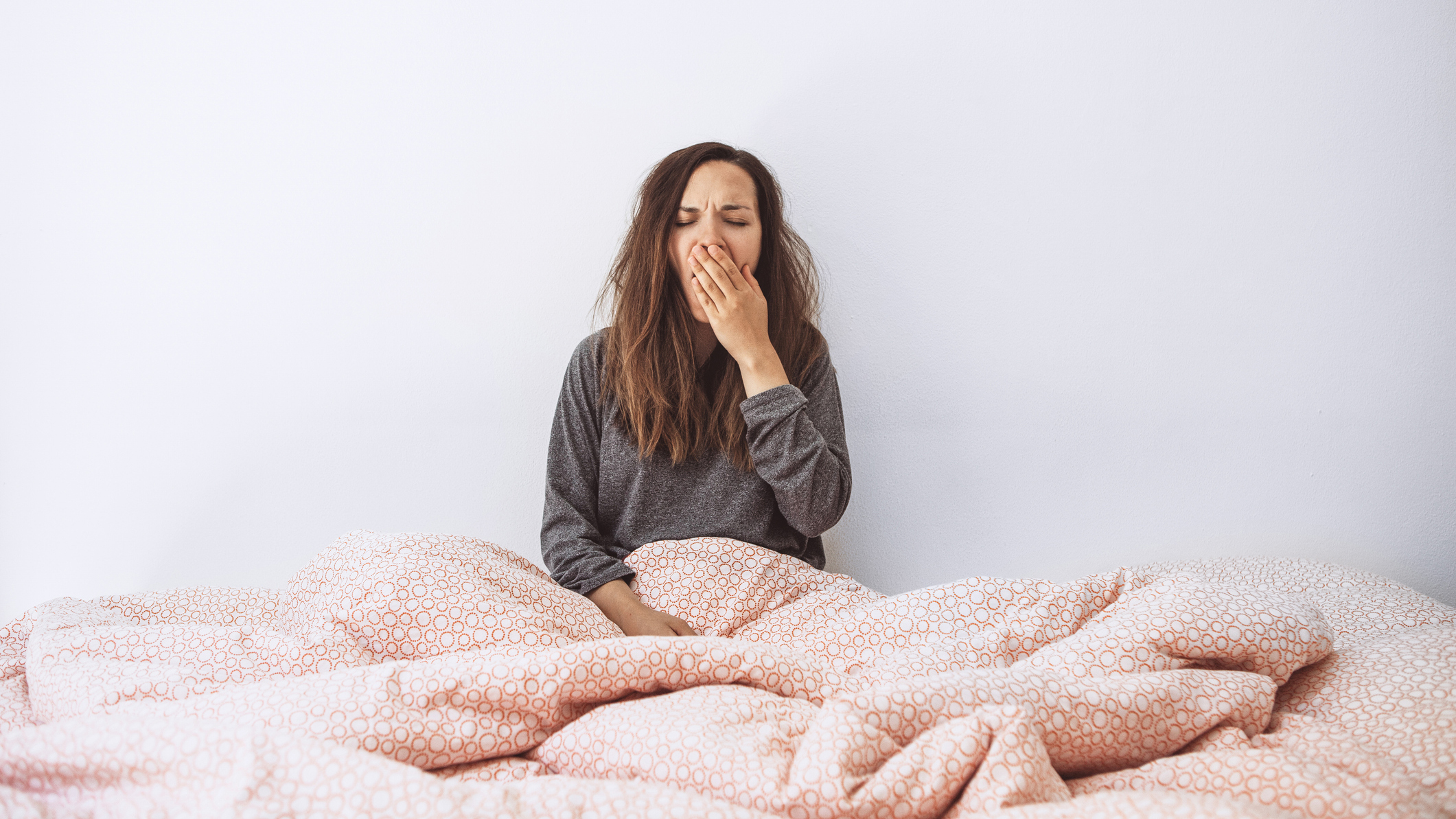I asked a parasomnias expert what was causing my night terrors – her answer surprised me
"Stress will push you to the edge if you're prone to night terrors," Dr. Acostamadiedo says

When I was in my early teens, I experienced what I thought was a night terror for the first time. I woke up screaming, convinced that there were thousands of spiders crawling on me. I ran out of my bedroom and had to be calmed down by my parents. I’m now in my early 20s, and I still experience this same night terror at least twice a month.
So, I decided to learn more about it. Why do night terrors or hallucinations occur? What triggers them? What is the brain doing when they occur? And, most importantly, is there any way to stop them?
I spoke with Dr. Jennifer Acostamadiedo, a sleep medicine physician at UCLA Health. Dr. Acostamadiedo is also a sleep medicine advisor at Seek, a company that provides at-home testing to designed to help women monitor how alcohol affects their health and sleep. The most common issue she treats is night terrors, so we met online to discuss my experiences and to find out more about what might be causing my parasomnias.

Dr. Jennifer Acostamadiedo, MD, is a sleep medicine physician and sleep advisor at Seek, a company that offers at-home tests designed to help women learn more about how alcohol impacts their health. Dr. Acostamadiedo has extensive experience working with women on sleep-related issues, whether they're due to hormonal or lifestyle changes. She has worked as a staff physician at UCLA Health, Kaiser Permanente and Sleep Health MD.
I often wake up screaming, hallucinating spiders crawling on my bed. Are these night terrors?
"In medical terms, night terrors are differentiated from other parasomnias depending on what stage of sleep they take place in. But there are also hallucinations. Even though they feel like night terrors, hallucinations are very common."
In medical terms, night terrors are differentiated from other parasomnias depending on what stage of sleep they take place in.
"So, if you wake up recalling an event but not quite sure if you were conscious or not that, tells us it happened in your REM state, meaning it’s likely to be another parasomnia like sleep talking, hallucinations or sleep walking.
"When we don’t have a recollection, they’re more likely to be in stage 3 deep sleep. And night terrors specifically are in the deeper, stage 3 sleep, so by definition, people will have no recollection of it whatsoever. So that’s the big difference. But they are connected."
I started experiencing this when I was a teenager, is that a common age?
"Night terrors are usually more common in kids, like younger kids between the ages of 3 to 7 years old, but that doesn’t mean you can’t have it later on. When someone experiences parasomnias early in their life, they have a higher risk of experiencing it later on in life.
Chronotypes are the natural preferences of wake and sleeping times. A 'night owl' is a chronotype that refers to people who naturally feel more energized later in the day, so they often go to sleep later and wake up later.
"Hallucinations as you describe are really really common in teenagers. There are two types, one we call hypnagogic hallucination and hypnogogic hallucinations. What this means is that one occurs when you’re falling asleep and one occurs when you’re waking up. They feel very real, and feel like night terrors because it’s an intrusion of your sleep into your waking conscious or an intrusion of your waking state into your sleep.
"They are also common in teenagers because they are related to sleep deprivation. When we are sleep deprived, we get changes to the normal structure of our sleep. REM pressure pushes you into sleep stages more quickly, that intrusion can be seen in the brain, and there are changes in the brain chemistry from not having the normal cycle of sleep, and this can cause those hallucinations. And they’re very scary.
"Teenagers tend to be more night owls, they tend to go to bed really, really late and society forces them to wake up early to go to school… so they don’t have enough hours [of sleep] for their body and brain to function."

What can trigger night terrors?
"Sleep deprivation is a super common trigger. The second one is that any stress will trigger these events. Emotional stress, like anxiety, depression, or just having a rough day are all big triggers. Then you also have to consider alcohol and medications. Especially medications that alter your brain chemistry, like antidepressants. We know the family of SSRIs have a big impact on your REM sleep.
"So, there are many variables that can trigger these experiences, but we know the short answer is that stress will push you to the edge if your physiology means you’re prone to night terrors.
Stress will push you to the edge if your physiology means you’re prone to night terrors.
"Other diseases like not breathing well (sleep apnea) will mean the quality of your sleep is not good. Therefore, even if you sleep 7-9 hours, are you really sleeping for 7-9 hours? There are rare diseases like narcolepsy and idiopathic hypersomnia that have symptoms of night terrors, but they’re so rare that we take the variables that are more obvious first, and then consider the more rare diseases. But it can happen.
"But knowing what triggers specific night terrors or hallucinations depends a lot on when they occur."
My hallucinations occur in the middle of the night and sometimes as I’m falling asleep
"This sounds like the most common trigger, sleep deprivation, definitely. Everyone in society assumes we just need 7 hours, but with my experience everyone is different. I mean, that’s the average we need based on research because most people said they felt great with 7 hours but you know, there are so many variables on that.
"I have friends who sleep 5 hours and are fine, and I have friends that need 9 hours and can’t function without it. There’s nothing abnormal about that, it’s just how your body functions."
I also sleep talk and move around a lot. Is this connected?
"Our motor system is connected with our brain, specifically the dopamine pathway, so they are connected. Many parasomnias have overlapping causes, meaning you’re more likely to experience movement, sleep talking and night terrors together.
"A fun fact is that when we are in REM and our brain is so active, we produce a hormone that paralyses us. But it’s called rapid eye movement because the eyes are the only ones that have a different connection in our nervous system so they don’t get paralysed, so they still have movement while the rest of our body is paralysed.
REM (rapid eye movement) is the fourth stage in our sleep cycle. This is when brain activity increases, which is why most people will experience dreams during this stage.
"So then we have to think, why are you not getting paralysed if you’re moving and talking in your sleep? Sometimes, it’s because of dysregulation of your sleep cycle and sleep deprivation is definitely the most common reason, but it’s not the only one.
"Then there’s also what triggers sleep deprivation, like alcohol will definitely change your hormones and brain system and how it interacts with your sleep cycle. But then we go into other medications, like antidepressants, which we call REM suppressors and we have seen movement disorders associated with those, so medication can also trigger those and change them."

I was on SSRIs a couple of years ago. Would it have any lasting effect?
"I want to say yes and no. Because technically it shouldn’t… but in the in-lab PSG (polysomnography) tests, when you have taken SSRIs, your eyes change their movement, and we see it even if they (the individual) have not taken it in years.
"So, that will tell you maybe there is still something changed in the brain, because why would your eyes still be affected? We call it SSRI eyes, so it does make you question how much changes in the chemistry of your brain even after you’ve stopped taking them."
My hallucinations are always spiders. How common is it to have one recurring theme and what causes it?
"Spiders are very common, I don’t think we do know why, but shadows and spiders are very common. When I was training, I trained in the veteran’s hospital and the closest relationship we saw is with PTSD because the veterans experienced night terrors that were related to their past experiences. The science explanation is that your body is responding to fight or flight, it’s how your body will react to attack.
I’m sure growing up everyone has cultural things they are told to fear, like snakes and spiders, and night terrors can be our brain’s way of responding to these.
"We don’t know what causes the common theme of the actual dream or nightmare that is happening, but there are very common recurring images, like the fear of an animal, and especially shadows. Shadows is the most common. But there’s nothing I can tell you about knowing exactly why these happen.
"I’m sure growing up everyone has cultural things they are told to fear, like snakes and spiders, and night terrors can be our brain’s way of responding to these."
My mum experiences the same as me, could genetics be at play here, too?
"Yes, there is a genetic component specifically in parasomnias, especially in movement disorders, there has been a correlation noticed. I can’t tell you that the content or theme of the dream is genetic, but we have seen some correlation between parents and children being predisposed to these experiences."
Are there any ways to prevent night terrors?
"Yeah, you can try a diary to figure out what’s triggering your episodes. What days did you have those nightmares? Then you can go back and see if there is anything in your daily routine that is triggering this.
"Like, let’s start with the most obvious. Did I have any stress or emotional impact? Did I go out and have some drinks with some friends? Was I snoring? Did my husband tell me I was more active that night?
"We know scientifically that all of those are known to cause more night terrors or parasomnias, so definitely being more conscious about them can help."

Is there anything else you think would be helpful for the readers to know?
"I mean, definitely checking if you’re snoring, because sleep apnea is overseen. I talk about it culturally, because my background is South American and we think of our snoring as being normal because that’s how we’ve grown up, but it’s important to be checked for sleep apnea because it’s one of the most common stressors of not getting good quality sleep and therefore will trigger these events more.
To have a good quality of life when you’re awake, you need your body to rest and recover when you’re asleep.
"In women especially, we don’t present with the classical symptoms like snoring or gasping for air, we actually present more with insomnia and fatigue and mood disorders. And we tend to get dismissed because we’re less likely to be overweight and it’s usually more to do with our anatomy. This can have a cardiovascular impact if you’re not resting and recovering at night, and they could trigger these events, so your mood and quality of life will be disturbed by it.
"Another consideration is alcohol. It’s very accepted in our society, but it causes a lot of disturbances and it changes our brain chemistry that will trigger these events. Sleep is as important as being awake because our bodies recover when we sleep. To have a good quality of life when you’re awake, you need your body to rest and recover when you’re asleep."

Lauren is an experienced writer and editor in the health and lifestyle industry and has led many campaigns and projects that deliver news, advice, and research on all things sleep. As the Sleep Features Editor for Tom’s Guide, Lauren writes, commissions and edits sleep and mattress content, from in-depth how-tos in sleep and mattress health to interviews with doctors and neuroscientists on the latest news in sleep. Lauren regularly tests new sleep tech and accessories to evaluate their effectiveness for getting good quality sleep and easing specific sleep struggles like nighttime anxiety. Alongside this, Lauren reports on the best mattress brands out there, like Helix, Saatva, and DreamCloud, helping readers find the right mattress for them and the best deals on them.